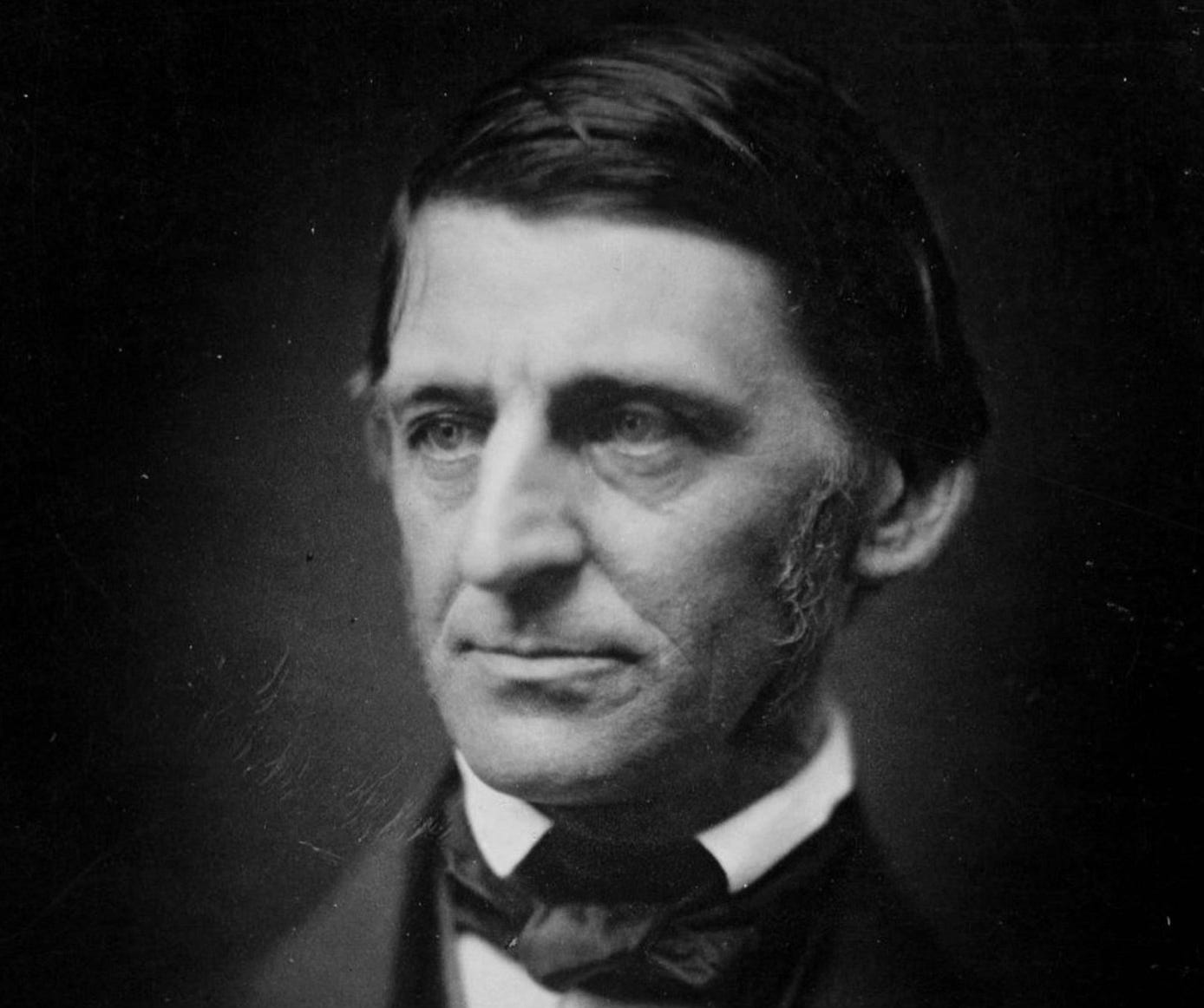Ralph W. Emerson’s Cardinal Rules For Life
Two Questions That Are Helping Me Design The Future I Want
Hello everyone,
Postanly Weekly is a reader-supported smarter living newsletter. To support my work, you can upgrade to a paid subscription for $7 per month or $40 for an entire year. With a modest yearly contribution you’re not only helping keep Postanly Weekly going, you also get free access to Thinking Toolbox (mental models for life) and Mental Wealth Toolbox (practical concepts for smarter decisions).
Emerson’s Cardinal Rules For Life
Ralph Waldo Emerson is one of the greatest thinkers of the 19th century. As Ernest Holmes noted, “Many have attempted to establish an intellectual system out of Emerson’s ideas. Nevertheless, no other writer has done so much to give form and expression to a particular world-view.” Great thinkers have some rules to live by. Ralph, a prominent writer, was one of them. While he is known for his poems and essays, he also had a few more things to say about life.
His philosophy, Transcendentalism, a school of philosophical thought that emphasises intuition and individual experience over objective reality, became popular in the United States in the mid-19th century. Emerson’s lessons for life apply to any situation. His words offer wisdom and guidance without judgment. They can be applied to various situations, from career to relationships, personal growth to self-care.
Emerson’s writings on self-reliance and self-improvement are among the most popular of his work. Among his most famous quotes are “Trust yourself: you know more than you think you do, “A foolish consistency is the hobgoblin of small minds, “People only see what they are prepared to see,” and “Nothing great was ever achieved without enthusiasm”.
Improve your capacity for independent thinking
One key lesson from Emerson’s life is that we should trust ourselves. He stressed the importance of self-confidence and believing in your abilities. He also thought that self-reliance was the best way to achieve success. “The only person you are destined to become is the person you decide to be,” he said.
Ralph Waldo Emerson was famous for his essays, most notably Self-Reliance. He is also known for his motto “Trust in Providence”, which can be seen throughout his works. The main idea of Self-Reliance is to rely on yourself and trust in your ability to make things work out.
In “Self-Reliance”, he writes: “Build your own happiness by cultivating a spirit of independence and a capacity for self-reliance.” Emerson argued that feelings of self-sufficiency are necessary if people are to develop a strong sense of personal identity and resilience against the forces of social conformity.
He believed that people should be able to rely on themselves rather than on others. This mindset can help people feel less lonely and more connected with their world. By learning to trust yourself, you can learn how to solve problems and make the best decisions possible for yourself. This can be applied to relationships, getting a job, or starting a business.
You can also go after what you want without worrying about validation or judgments by relying on yourself. “To be yourself in a world that is constantly trying to make you something else is the greatest accomplishment,” says Emerson.
You may feel alone when you are pursuing something that seems impossible, but in reality, the whole world is there supporting you every step of the way.
Emerson once said, “ Life is a great stage play with frequent intermissions.” Life is a series of ups and downs that make things interesting. We all go through phases where we are inspired to live life to the fullest and become our best selves.
A good life is an experiment in progress
He thought seeking truth was important in life. Never be content with things as they are. Be ever reaching out after higher things. Be on the watch for truth everywhere — in other people, times, and places. Seize it if you can. It may never return your greetings, but at least it may cause you to wonder, seek and find something that was lost a long time ago.
Emerson believed that each person has the capacity for greatness and should seek out opportunities that will allow them to express their innate talents and potential. He encouraged people to live with purpose, taking action in areas where they are most comfortable and excited.
“Life is a succession of lessons which must be lived to be understood. All is riddle, and the key to a riddle is another riddle,” he said.
He also encouraged people to be mindful of their surroundings.By being conscious of the world around them, they can learn about people and how they impact others. Through this process, people can become more empathetic and care more about others. One can grow as a person by being open-minded, curious, and accepting.
Short rules for life
“The purpose of life is not to be happy. It is to be useful, to be honorable, to be compassionate, to have it make some difference that you have lived and lived well.” — Ralph Waldo Emerson
Emerson’s principles for a good life are simple: Live with enthusiasm and passion. Don’t take things too seriously or too lightly. Take each day as it comes, and do your best to be the person you want to be.
Be curious about the world around you and try to understand what makes other people tick. Learn from those around you and put yourself in situations where you can learn from others. Love yourself for who you are.
Be kind and respectful to yourself to show the same respect to others. Treat yourself with kindness, love and compassion so that you can treat others with the same in return.
Be grateful for all the good things in your life and appreciate each moment you experience. Work hard to keep a positive attitude to stay focused on what’s important while keeping things in perspective.
Food for thought
Two Questions That Are Helping Me Design The Future I Want [free read on Medium]
Most people do little with their lives because they’ve convinced themselves what they choose to do is not worth it. They imagine the very worst outcome.What if I’m wrong? What if I fail? What if something goes wrong?
I start with:
“What if I’m right?”
And “What does this action make possible?”
“What if I’m right?” inspires action. It gets rid of doubt. It’s the seed of belief.
Belief takes me to the next step: action and what it makes possible. It turns every day into a series of experiments, “what ifs” and “I wonder ifs.”
Why doesn't advice work? [Dynomight]
“Maybe we ask for advice because we want reassurance that our pre-determined choices are right. If you ask enough people, eventually someone will give you validation. Or maybe we ask for advice to have something fun to talk about. Asking someone for advice is a genuinely great way to start a conversation—though it might work best with hypotheticals. Or maybe advice is a “guardrail”. Even if we know what we want to do, we want to make sure other people don’t have irrefutable proof it will lead to catastrophe. That could still be worth it even if we only change our minds 1% of the time. Or, if you’re an economist, try this: Advice is cheap. So maybe we keep asking for advice in more and more situations where it’s increasingly unlikely to be helpful, until expected benefit matches the (tiny) cost.”
The meaning of intelligence, described by 52 researchers:
“Intelligence is a very general mental capability that, among other things, involves the ability to reason, plan, solve problems, think abstractly, comprehend complex ideas, learn quickly and learn from experience. It is not merely book learning, a narrow academic skill, or test-taking smarts. Rather, it reflects a broader and deeper capability for comprehending our surroundings – ‘catching on,’ ‘making sense’ of things, or ‘figuring out’ what to do.” — Genetics of intelligence
A question worth asking:
Behavioural change happens when the pain of changing is perceived or felt to be less than the pain of staying. I think therefore it helps to ask, how am I benefitting from this situation? And can I describe if I am running from something or towards something?
Work with Postanly. Partner with us here.
Thanks for reading!
Until next week,
Thomas
Medium | All Courses | The Write Life | Philosophy For Modern Life
Postanly Weekly is now a reader-supported publication. To support my work, you can upgrade to a paid subscription for $7 per month or $40 for an entire year. With a modest yearly contribution you’re not only helping keep Postanly Weekly going, you also get free access to Thinking Toolbox (mental models for life) and Mental Wealth Toolbox (practical concepts for smarter decisions).





This article on Ralph Waldo Emerson's brilliant work and writings helped me very much today. It teaches you that you don't always need the acknowledgement of others to travel the path you're on. We have to be brave and take the necessary steps to make our way in the world and leave our individual mark. We only get this one precious life, so we need to have courage and speak our own truth.
As Michele Obama says, we are practicing what we want to be...Julie